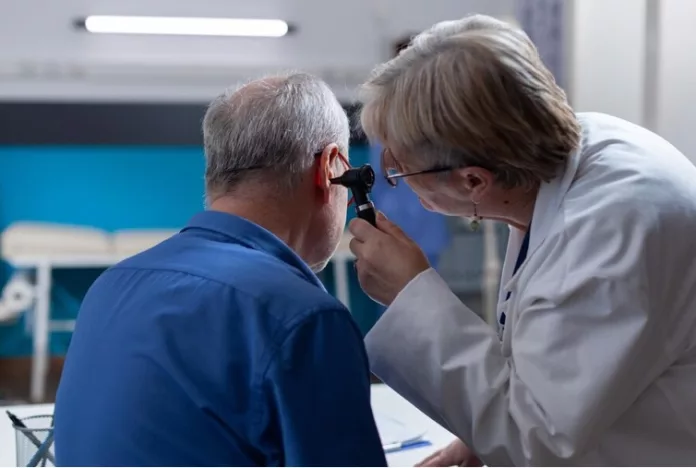Ear wax removal specialists (also called aural care practitioners) are healthcare professionals who safely remove excessive ear wax using various techniques. This guide will explain how to enter this growing healthcare field in the UK. Ear wax removal training is very important to become an ear wax removal specialist.
Required Qualifications
Basic Requirements
- Must be 18 or older
- Have a good general education (GCSEs or equivalent)
- Clear DBS (Disclosure and Barring Service) check
- Good eyesight and manual dexterity
- Excellent communication skills
Professional Background
Most specialists come from one of these backgrounds:
- Nursing
- Audiology
- Healthcare assistance
- ENT practice
- Practice nursing
Having experience in these fields gives you a solid foundation for understanding patient care and medical procedures. Many successful ear wax removal specialists start their careers in these areas, which helps them develop the crucial skills needed for the specialty. If you’re currently working in one of these fields, you’re already on the right path.
Training Pathways
Foundation Training
- Basic Healthcare Qualification
- Level 3 Diploma in Healthcare Support
- Level 3 Certificate in Healthcare Services
- Nursing or audiology degree
These qualifications serve as your stepping stones into the field. Think of them as building blocks that create a strong foundation for your specialist career. Each qualification offers unique insights and skills that will prove valuable in your day-to-day practice.
2. Core Medical Knowledge
- Anatomy and physiology of the ear
- Understanding of hearing mechanisms
- Basic clinical skills
- Infection control procedures
This knowledge forms the backbone of your practice. Just like a builder needs to understand foundations before constructing a house, you need to thoroughly understand ear anatomy before performing any procedures. Take your time with this learning – it’s crucial for safe practice.
Specialist Training
Approved Courses
The journey to becoming certified involves completing accredited courses covering:
- Microsuction technique
- Irrigation methods
- Instrumentation (manual removal)
- Ear examination
- Patient assessment
- Health and safety protocols
These courses aren’t just about ticking boxes – they’re about developing real-world skills you’ll use every day. Each technique you learn adds another tool to your professional toolkit. The more comfortable you become with each method, the better service you can provide to your patients.
Recognised Training Providers
- ENT UK approved centres
- British Society of Hearing Aid Audiologists (BSHAA)
- British Academy of Audiology (BAA)
- Private healthcare training companies
Equipment and Skills
Essential Equipment Knowledge
- Microscopes
- Microsuction units
- Otoscopes
- Irrigation systems
- Jobson Horne probes
- Sterile instruments
- PPE (Personal Protective Equipment)
Technical Skills
Must become proficient in:
- Patient assessment: This involves more than just looking in ears. You’ll need to master the art of taking detailed patient histories, understanding their concerns, and choosing the most appropriate treatment method.
- Otoscopy examination: Think of this as your window into the ear canal. You’ll learn to identify different types of wax, spot potential complications, and make informed decisions about treatment approaches.
- Microsuction technique: This advanced skill requires steady hands and excellent concentration. It’s like learning to perform a delicate dance – every movement must be precise and controlled.
- Irrigation method: While this is a traditional technique, it requires careful judgment and expertise to perform safely and effectively.
- Manual removal: This requires the most delicate touch and expert handling of specialized tools.
- Documentation: Clear, accurate record-keeping is your safety net and your patient’s history book.
- Emergency procedures: Like a pilot’s emergency training, you hope you’ll never need it, but it’s essential to be prepared.

Setting Up Practice
Employment Options
- Working for Others
- NHS clinics: Offering stability and structured progression
- Private audiology clinics: Often providing more specialized experience
- GP surgeries: Great for building community connections
- ENT practices: Excellent for complex case exposure
- Healthcare centres: Good for varied patient experience
Starting in these settings gives you valuable experience without the pressures of running your own business. Think of it as paid training – you’re learning while earning.
2. Self-Employment
- Private practice: Complete control over your work environment
- Mobile service: Flexibility and wider patient reach
- Clinic partnerships: Shared resources and referral networks
- Franchise opportunities: Established systems with support
Business Requirements
If setting up independently:
- Legal Requirements
- Register with Companies House
- Register with HMRC
- Obtain necessary licenses
- CQC registration if required
Think of these as the foundations of your business house – they must be solid and properly in place before you start building. Take time to understand each requirement thoroughly, as they protect both you and your patients.
2. Self-Employment
- Private practice: Complete control over your work environment
- Mobile service: Flexibility and wider patient reach
- Clinic partnerships: Shared resources and referral networks
- Franchise opportunities: Established systems with support
Business Requirements
If setting up independently:
- Legal Requirements
- Register with Companies House
- Register with HMRC
- Obtain necessary licenses
- CQC registration if required
Think of these as the foundations of your business house – they must be solid and properly in place before you start building. Take time to understand each requirement thoroughly, as they protect both you and your patients.
2. Business Planning
- Business plan: Your roadmap to success
- Marketing strategy: How you’ll attract and retain patients
- Pricing structure: Balancing affordability with profitability
- Equipment investment: Quality tools for quality care
- Location selection: Accessibility and professional environment
Your business plan isn’t just a document – it’s your blueprint for success. Take time to research your local market, understand your potential patient base, and plan your services accordingly. Remember, the most successful practices often start with the most thorough planning.
Ongoing Professional Development
Continuing Education
- Annual updates in techniques
- New equipment training
- Clinical governance updates
- Health and safety refreshers
- Patient care improvements
Professional Memberships
Maintain membership with:
- BSHAA
- ENT UK
- Local clinical networks
- Professional forums
Practical Experience
Clinical Practice
Required to complete:
- Supervised practice hours
- Case studies
- Competency assessments
- Patient feedback collection
- Clinical audits
Documentation
Must maintain:
- Patient records
- Treatment logs
- Equipment maintenance records
- Continuing professional development log
- Insurance documents

Career Progression
Advanced Practice
Can specialise in:
- Complex cases
- Pediatric care
- Elderly care
- Training others
- Clinical supervision
Business Growth
Options include:
- Opening multiple clinics
- Training provision
- Equipment supply
- Consultancy services
- Professional speaking
Financial Considerations
Initial Investment
- Training courses (£2,000-£4,000)
- Equipment (£5,000-£15,000)
- Insurance (£500-£1,000 annually)
- Registration fees (varies)
- Marketing (£1,000-£3,000)
Income Potential
- NHS Band 5-6 (£25,655-£39,027)
- Private practice (£40-£80 per treatment)
- Training provision (£500-£1,000 per day)
- Mobile service (£60-£100 per visit)
Best Practice Guidelines
Clinical Standards
- Follow infection control protocols
- Maintain sterile environment
- Keep accurate records
- Obtain informed consent
- Provide aftercare advice
Patient Care
- Clear communication
- Thorough assessment
- Treatment explanation
- Aftercare instructions
- Follow-up arrangements
Resources and Support
Professional Support
- Mentoring programmes
- Clinical supervision
- Professional networks
- Online forums
- Local peer groups
Useful Organisations
- BSHAA
- ENT UK
- Royal College of Nursing
- Health and Care Professions Council
- British Academy of Audiology
Tips for Success
- Starting Out
- Get thorough training: Never stop learning or improving your skills
- Build practical experience: Every patient teaches you something new
- Network with professionals: Your colleagues are your best resources
- Join professional bodies: Stay connected with your industry
- Maintain high standards: Your reputation is your most valuable asset
2. Building Practice
- Focus on patient care: Happy patients are your best advertisers
- Keep detailed records: Documentation protects you and your patients
- Invest in good equipment: Quality tools make for quality work
- Build professional relationships: Referral networks are golden
- Maintain continued learning: The field is always evolving
Remember: Quality patient care and safety should always be your top priority in this profession. Every patient who walks through your door trusts you with their health – that’s a responsibility to take seriously and a privilege to cherish.
Also Read: Sports Medicine in India: How Indian Athletes are Treated

